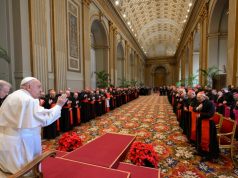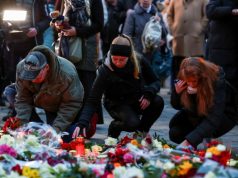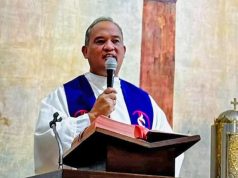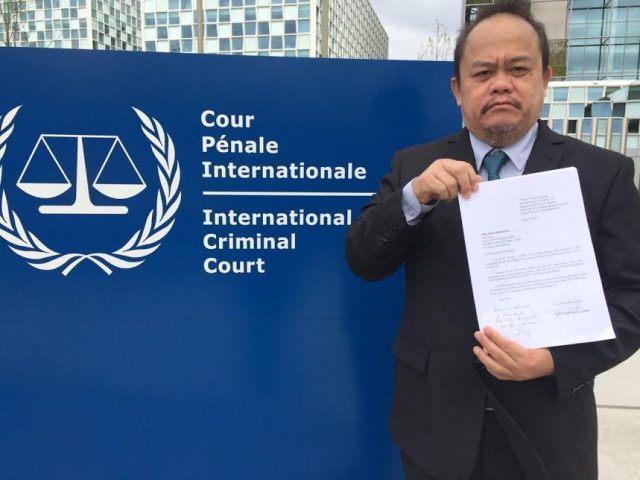
MANILA, Philippines – President Rodrigo Duterte and several senior officials were charged before the International Criminal Court (ICC), based in The Hague, the Netherlands, for the alleged mass murder or extra-judicial executions linked to the administration’s war on illegal drugs, which their accuser claimed constituted “crimes against humanity.”
Lawyer Jude Sabio submitted a 77-page complaint to the ICC seeking an investigation of the mass killings, and the prosecution and conviction of those in the charge sheet.
Sabio served as lawyer of Edgar Matobato, the confessed hitman who testified that Duterte, as Davao City mayor, was behind the Davao Death Squad.
Aside from Duterte, also listed as respondents were other government officials deemed in violation of various provisions of the Rome Statute:
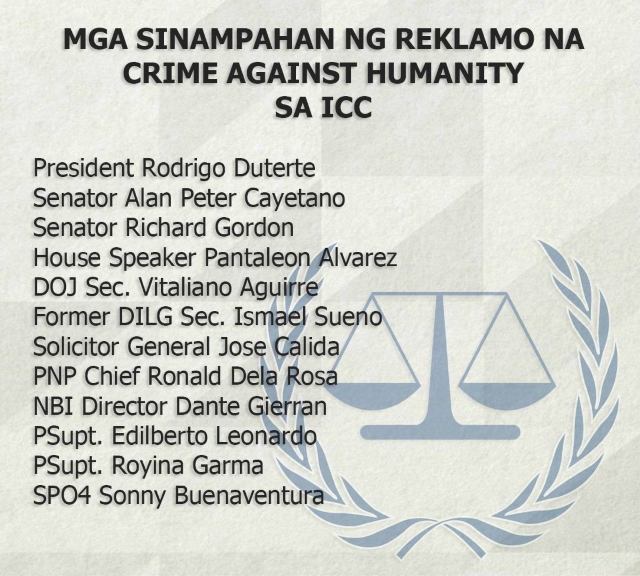
Sabio said he brought the case to the ICC “in the interest of international criminal justice and in the interest of the rights of the thousands of human rights victims and their families.”
He asked the Prosecutor of the ICC to “conduct an analysis of the situation of mass murder in the Philippines, as well as the criminal liability or responsibility of then Mayor and now President Duterte and his senior officials, through the method of a preliminary examination to determine compliance with jurisdiction and admissibility requirements.”
Sabio also sought the arrest and detention of Duterte and the other respondents, and “after trial, convict them and sentence them to corresponding prison sentence or life imprisonment.”
The Rome Statute is the treaty that established the ICC, the first permanent international court that is capable of trying perpetrators of genocide, crimes against humanity, war crimes and the crime of aggression, the Statute’s four core international crimes.
The Philippines is a state party to the Rome Statute, together with other 123 state parties, after ratifying it in August 2011.
Sabio said Duterte committed “crimes against humanity,” which were present in the following elements:
- Commission of mass murder, as mastermind of the Davao Death Squad, which killed thousands of people in Davao City. The continuation by Duterte of his war on drugs when he became president resulted in more deaths.
- Systematic or widespread attack on a civilian population, mostly the poor.
- Knowledge of the attack.
Sabio said that, despite the call of local and international human rights groups to stop the killings, Duterte has ignored the warnings and his officials and allies “have become instruments in covering up the issue in the media and Senate investigations conducted.”
“It is for these reasons that I have referred this case to the ICC to make President Duterte accountable for his crimes in the name of international criminal justice, and to once and for all end this dark, obscene, murderous and evil era in the Philippines,” he said.
Timing is suspect: Palace
For its part, Malacañang, through Presidential Spokesman Ernesto Abella, said “the timing of the filing of the case is suspect – apparently meant to create negative news in the midst of the Philippines ASEAN debut.
“As it cannot prosper. International Criminal Court rules provide that the ICC, as a court of last resort, will only exercise jurisdiction over a case once legal remedies in the Philippines have been exhausted.
“Atty. Sabio or his client, Mr. Edgardo Matobato, did not avail/exhaust all domestic remedies allowed under the Philippine Constitution.
“Furthermore, an independent Senate investigated the charges hurled against the President with self-confessed hitman Mr. Batobato as star witness. As such, there is no unwillingness or inability on the part of the State to investigate and prosecute the President.
“The so-called ‘Extrajudicial killings’, are not state-sanctioned or state-sponsored. Police authorities are conducting legitimate operations that require observance of operational protocols, and those who breach procedures are made to answer before the law.
“The Philippine National Police (PNP) has an Internal Affairs Service (IAS) tasked to probe police accused of violating procedures. This body can suspend or dismiss PNP personnel based on violations incurred and can recommend the filing of criminal charges.
“The intent of this filing in ICC is clearly to embarrass and shame the President, and undermine the duly constituted government of the Philippines. It is a cynical effort against the reform-oriented agenda of the Duterte Administration and of the betterment of the lives of the Filipino people.”




